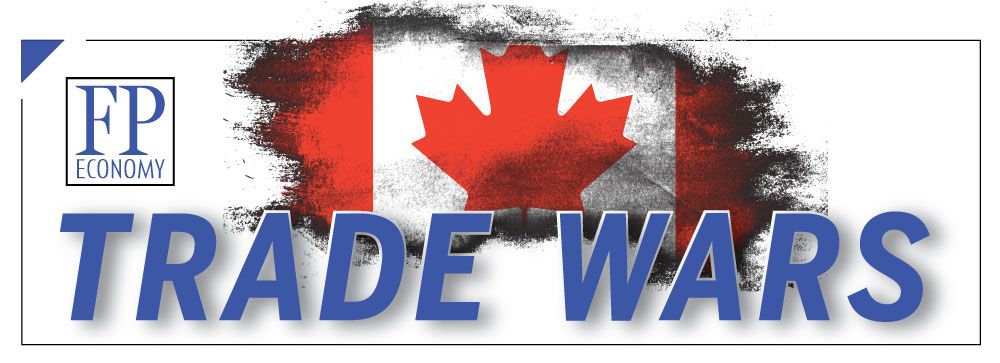Canada beats the U.S. on many measures from income inequality to longevity, Scotiabank economist says
Article content
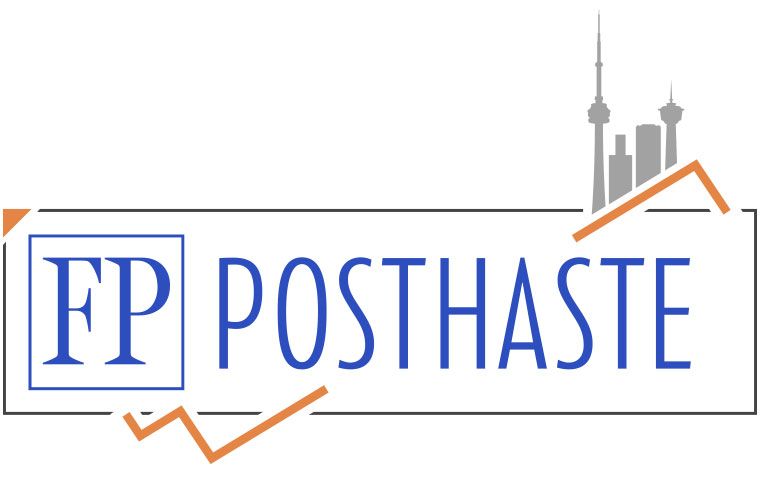 United States President Donald Trump on Monday repeated the idea that Canada would be better off as the 51st state because it wouldn’t have to worry about him signing yet another executive order imposing tariffs while placing them on steel and aluminum.
United States President Donald Trump on Monday repeated the idea that Canada would be better off as the 51st state because it wouldn’t have to worry about him signing yet another executive order imposing tariffs while placing them on steel and aluminum.
Article content
Article content
His statements have many Canadians up in arms, but it’s also given them a new gear to express their national pride.
Advertisement 2
Article content
Besides negating tariffs, higher average incomes in the U.S. have been touted as another selling point for erasing the border between the two countries.
But there’s lots more to consider when comparing the neighbour nations, according to Derek Holt, vice-president and head of capital markets economics at the Bank of Nova Scotia.
“Canada ranks only slightly behind the U.S. on median household incomes,” he said in a note on Tuesday. “And there is more to the picture than incomes. Much more.”
Holt looked at a series of measures, from income inequality to life expectancy to urban liveability, and said the U.S. comes up short compared to Canada.
Here is a look at five of the 10 measures he examined and how each country stacks up.
Liveability
Canada has typically done well on the Economist magazine’s annual liveability index, with two of its cities placing in the top 10 in the 2024 edition. Calgary was No. 5 and Vancouver was tied for No. 7 among the 173 cities ranked. Toronto was just outside the top 10 (No. 12) due to its housing shortage.
The cities are ranked in five broad categories: stability, health care, culture and environment, education and infrastructure, “with the aim of showing how comfortable these cities are to live in,” the Economist said.
Article content
Advertisement 3
Article content
The highest ranking U.S. city was Honolulu at No. 23. Miami was among the 10 cities to fall the most on the index.
“Canada’s strengths are its public services, particularly its health-care and education systems, which consistently earn top scores,” the Economist said. “The country is also more stable politically and has less violence than does its southern neighbour.”
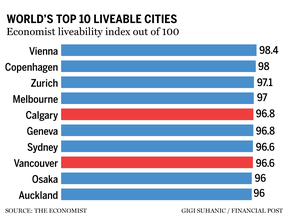
Income inequality
“On income inequality, there is no comparison,” Holt said.
He looked at the World Bank’s Gini coefficient that establishes how equitably income is being distributed in a society.
Gini — named after its creator, Corrado Gini — operates on a scale of zero to one, where zero means everyone has the same income while one is where one person holds all the income.
The U.S. had a score of 0.41 based on 2022 data in the most recent released update, while Canada had a score of 0.32 based on 2019 data.
Income is measured either on an after-tax basis or using consumption per capita.
Federal budgets
The ratio of the U.S. federal government’s deficit to gross domestic product (GDP) is seven per cent. Canada’s federal budget update estimated this country’s deficit-to-GDP ratio will come in at 1.6 per cent in the 2024/25 fiscal year.
Advertisement 4
Article content
“U.S. fiscal policy is mismanaged by a massively wide margin to Canada,” Holt said.
Life expectancy
Canadians have a better chance of living longer on average than Americans.
“Canada has longer life expectancy than the U.S. by several years on average according to both the United Nations and World Bank measures,” Holt said.
The average global life expectancy in 2023 was 70.8 years for males and 76 years for females, according to a World Population Review ranking of 229 countries using United Nations data.
In Canada, the average life expectancy was 83.2 years for both sexes, or 85.1 for women and 81.3 for men.
In the U.S., the average was 79.9 years, or 82.4 for women and 77.4 for men.
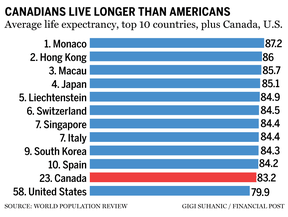
Health care
Health-care access also puts Canada above the U.S., Holt said, citing the Universal Health Care Coverage Service Coverage Index.
The index, which uses World Health Organization data, sets a range from zero to 100, where zero means no coverage and 100 means the opposite. The scale is based on indicators including reproductive, maternal, newborn and child health, infectious diseases, non-communicable diseases and service capacity and access.
Advertisement 5
Article content
Canada scored 91 based on 2021 data, while the U.S. scored 85.7.
“Don’t get sick in the U.S. if you have no insurance or little insurance, which is a whole other category; at a minimum, it can be financially ruinous if you are at all able to get treatment,” Holt said.
The other measures Holt looked at included human capital and development, education, murder and crime rates.
Sign up here to get Posthaste delivered straight to your inbox.

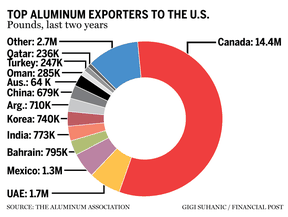
United States President Donald Trump signed orders imposing 25 per cent tariffs on all steel and aluminum imports “without exceptions or exemptions” on Monday evening.
“If we make it in the United States we don’t need it to be made in Canada,” Trump said in the Oval Office where he signed two proclamations closing existing loopholes and exemptions to restore his 2018 tariffs on steel and hike tariffs on aluminum.
“We’ll have the jobs, that’s why Canada should be our 51st state.”
Canada is bracing for these tariffs on March 12, amid Trump’s threats of the broader tariffs that were temporarily paused but could still take place.
Here’s a look at what the tariffs mean for each of the sectors, how Canada responded to similar tariffs during Trump’s first term and how Canada might respond this time around. — Serah Louis, Financial Post
Advertisement 6
Article content
Read the full story here

- Bank of Canada to release its summary of monetary policy deliberations for the Jan. 29 interest date decision.
- Today’s Data: U.S. inflation numbers for January
- Earnings: Barrick Gold Corp., Brookfield Asset Management Ltd., CI Financial Corp., BlackBerry Ltd., Sun Life Financial Corp., Agnico Eagle Mine Ltd., West Fraser Timber Co., Ltd., Choice Properties Real Estate, Kinross Gold Corp., Precision Drilling Corp.

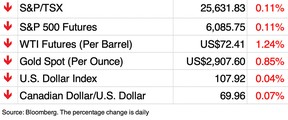


Canadians have a low level of financial literacy. At least, that’s the opinion of chartered accountant and Financial Post columnist Kim Moody. He thinks that if people had a better grasp of financial ins and outs, they would make different choices at the ballot box at all levels of government. Read more here
Advertisement 7
Article content
McLister on mortgages
Want to learn more about mortgages? Mortgage strategist Robert McLister’s Financial Post column can help navigate the complex sector, from the latest trends to financing opportunities you won’t want to miss. Read them here
Canada is at an economic crossroads. The FP Economy: Trade Wars newsletter brings you the latest developments from the Financial Post and across the Postmedia network every weekday at 7 p.m. ET. Sign up for free here.
Financial Post on YouTube
Visit Financial Post’s YouTube channel for interviews with Canada’s leading experts in economics, housing, the energy sector and more.
Today’s Posthaste was written by Gigi Suhanic, with additional reporting from Financial Post staff, The Canadian Press and Bloomberg.
Have a story idea, pitch, embargoed report, or a suggestion for this newsletter? Email us at posthaste@postmedia.com.
Recommended from Editorial
-

Expand TMX pipeline again to combat Trump tariff threat
-

Tariff threats have businesses rethinking exports, supply chains
Bookmark our website and support our journalism: Don’t miss the business news you need to know — add financialpost.com to your bookmarks and sign up for our newsletters here.
Article content
Canada would not be better off as 51st state
2025-02-12 13:00:31



